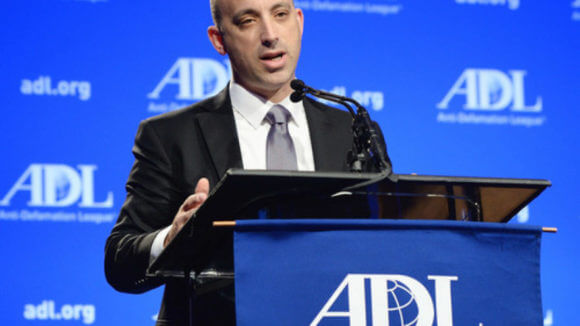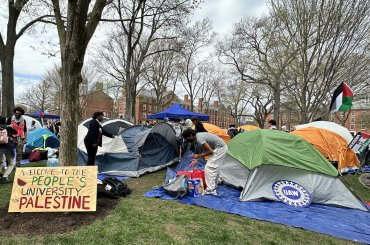On November 10th, the Anti Defamation League (ADL) will host its yearly conference in New York City, billed as the “World’s Largest Annual Summit on Antisemitism and Hate.” Though the ADL enjoys a reputation for progressive values in mainstream advocacy and policy circles, the conference program makes clear that it occupies a role closer to “conservative think tank” than civil rights defender. The roster of speakers runs the gamut from the hawkish neoconservative Liz Cheney and former IDF major general Doron Almog to FBI Director Christopher Wray.
This discrepancy—between the ADL’s claims to fighting hate and the conference’s hate-promoting speakers—speaks to a larger contradiction. Although the ADL benefits from its status as a premier civil rights organization, it has a long and ignoble track record of undermining the civil liberties of marginalized groups and actively participating in the repression of social movements. Today, its reputation as a moral authority is being challenged by the #DropTheADL Campaign, which has garnered the endorsement of over 100 progressive organizations that have cut ties with the ADL and call on others to drop it as a partner in social justice movements.
Although the ADL benefits from its status as a premier civil rights organization, it has a long and ignoble track record of undermining the civil liberties of marginalized groups and actively participating in the repression of social movements.
Its history includes efforts since the 1950s to inhibit Arab American participation in U.S. politics, its support for ineffective and discriminatory “Countering Violent Extremism” programs, and its ongoing accusations that the leading Muslim rights organization, CAIR, has terrorist affiliations. The ADL is also the single largest non-governmental police trainer in the U.S., organizing exchanges between U.S. and Israeli law enforcement agencies that fuel militarized policing in marginalized communities. Under the banner of civil rights, the ADL has surveilled and undermined leftist struggles, including movements for civil rights, socialism, the end of Apartheid, immigrants, farmworkers, queers, Palestinian liberation, and organized labor. Unsurprisingly, its legacy and tactics reveal a unquestioning fealty to US geopolitical interests and policy.
Yet the ADL maintains an influential role in the civic sphere, particularly within educational institutions. Evidence of this is apparent in the conference’s “High School Track,” which boasts student-oriented sessions on “Anti-Zionism’s Global Reach” and “How Students Are Confronting Anti-Zionism and All Antisemitism on Campus.” Declining public support for Israel among progressives has provoked a crisis of legitimacy among Zionist institutions, resulting in an increasing focus on secondary and tertiary education as the prime “battleground” for combatting the increasing support for Palestinian liberation.
The emphasis on recruiting students and educators into Zionist advocacy reflects two rising trends. First, Zionist organizations are increasingly targeting classrooms and campuses as “ideological battlegrounds” in an effort to quell growing youth support for Palestine. Second, these groups strive to conflate anti-Zionism with anti-Semitism, in order to smear advocacy for Palestinian liberation as a form of discrimination and lay the groundwork for legal action against activists. The ADL has long lobbied legislatures and organizations to adopt of a definition of anti-Semitism that includes criticism of Israel. These efforts represent not only a grave threat to First Amendment protections—they also aim to categorize pro-Palestinian stances as violations of Jewish Americans’ civil rights.
The ADL’s intervention into public education has already had disastrous consequences. In 2021, a coalition of right-wing advocacy groups, including the ADL, partnered in an assault on the California Board of Education’s proposed public high school Ethnic Studies Model Curriculum (ESMC), specifically targeting the inclusion of Palestine. Following this onslaught, the curriculum was warped beyond recognition, evidenced by the removal of modules about Palestine and Arab American Studies. A key provision of the new curriculum is the inclusion of the controversial IHRA definition of antisemitism, which equates criticism of Zionism with antisemitism. The result is an effort to force “Zionist-centric Ethnic Studies on public school students.” The ADL’s attacks on anti-racist education impacts all students from marginalized racial, social, and economic backgrounds. It threatens their right to a comprehensive education grounded in principles of justice, while also isolating educators who believe that their students have a right to a curriculum which reflects their conditions and histories.
The ADL’s attempt to shape the political consciousness of students poses a particular threat to Palestinian and Arab youth in the U.S. who are denied access to the revolutionary histories that are the foundation of our national identity. Zionism’s attempt to consolidate itself in the education system leaves our youth isolated, with few public institutions to engage our history and struggle. For Palestinian and Arab students, the ADL’s efforts represents an assault on our ability to resist, or simply describe, the conditions of our people’s ongoing dispossession.
The ADL seeks to make our history and struggle as Palestinians definitionally illegitimate. By collaborating with anti-Semitic, right-wing figures to advance this anti-Palestinian agenda, the ADL is only vindicating the growing white supremacist movement that is unleashing an assault on Critical Race Theory and other anti-racist pedagogical frameworks. The silencing of our movement in the realm of public education represents a broader right-wing assault against movements for racial and economic justice.
As the ADL brings together youth and educators in New York City tomorrow under the misleading banner of “fighting hate,” our movements must come together to affirm that the ADL is not an ally to working class and oppressed peoples, nor to students and teachers.



Five suggested ground rules for inviting an ADL representative to a classroom –
1. The US Constitution’s 1st Amendment guarantees each person the right to speak their view on any topic. There is no right to silence a view because someone feels offended by it. In other words, there is no right to be free from feeling offended. As the childhood saying goes, “Sticks and stones may break my bones, but names will never hurt me.”
2. A fundamental goal of the American education system is to encourage students to develop their own views by gathering facts, and analyzing the implications of those facts.
3. To ensure a full and honest examination of the relevant facts and logic, a representative of the ADL view and a representative of the anti-Zionist view will be invited to a class together. Thus, students can hear and question the facts and logic presented for both views.
4. ADL representatives who argue that anti-Zionist views are due solely to anti-Semitic attitudes will be required to present facts and logic supporting this view. They may not presume their conclusion.
5. Anti-Zionist representatives who argue that anti-Zionist views are due to facts and logic other than anti-Semitic attitudes will be required to present facts and logic supporting this view. They may not presume their conclusion.